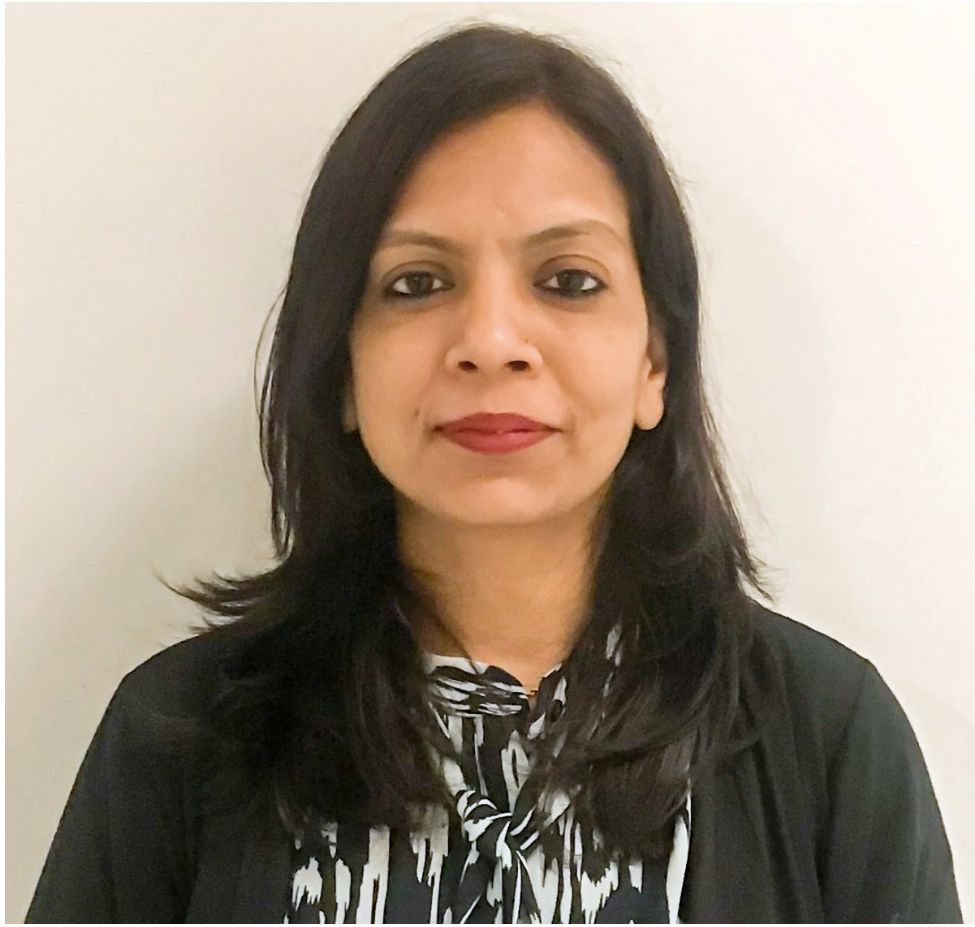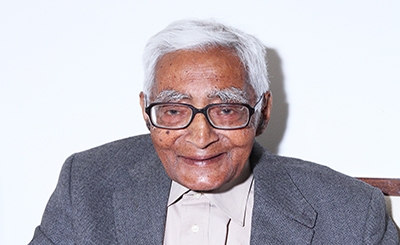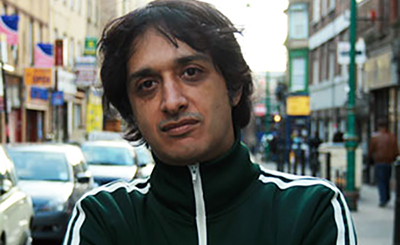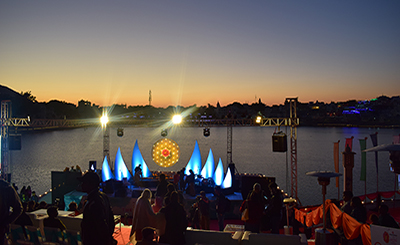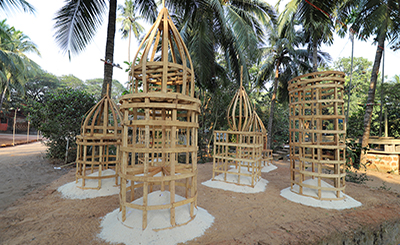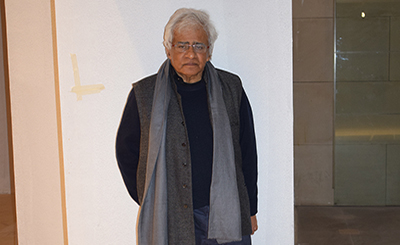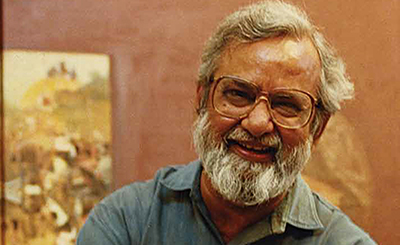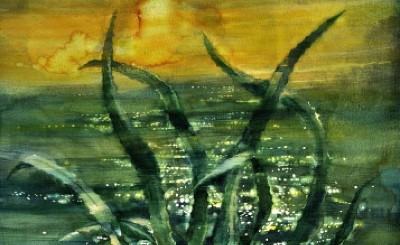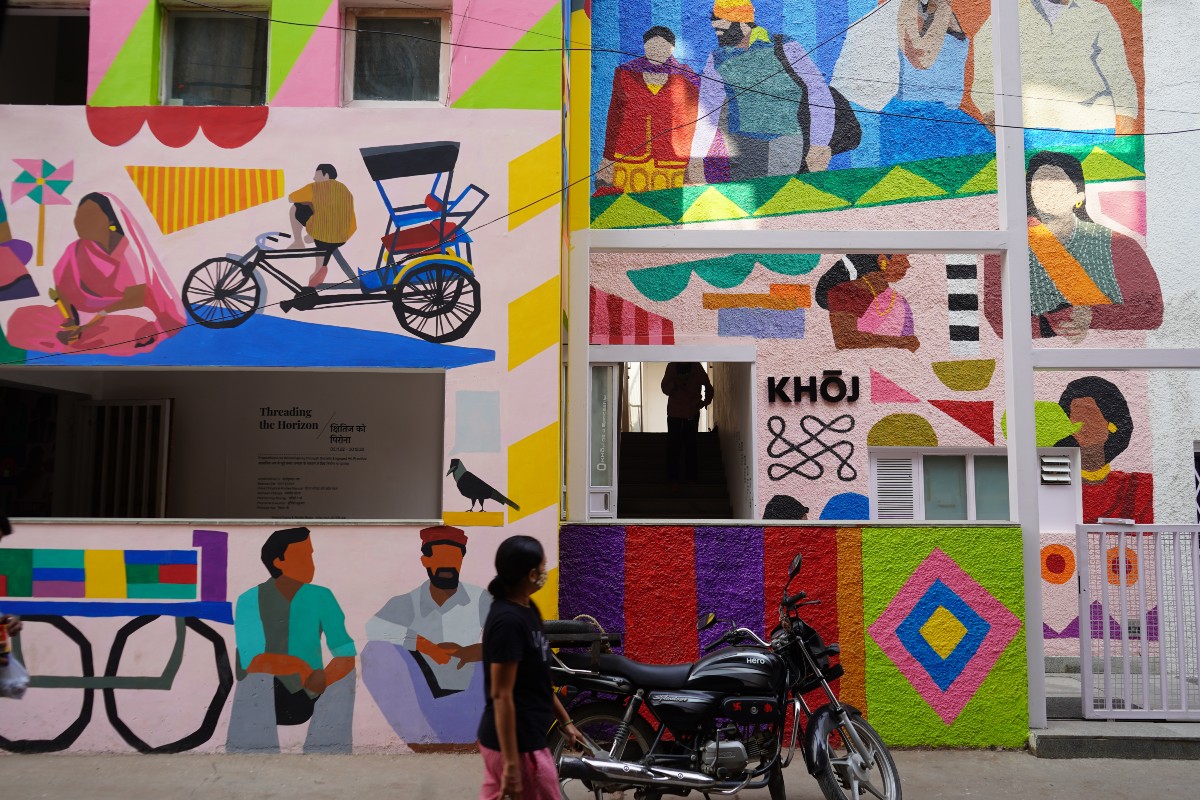
Yesterday. Today. Everyday. by Poornima Sukumar, in collaboration with Aravani Art Project, collaborates and co-creates along with the people from the Transgender community to excavate the wisdom they have inculcated over the years. Photos: KHOJ
Fourteen community-based projects from across India depict ‘acts of resilience that emerge through the artistic practice of strengthening voices, placemaking, bearing witness, negotiating visibility and leisure, healing and catharsis’
KHOJ International Artists’ Association was formed 25 five years ago to bring societal change through art, with an underlying belief that art is indispensable to society and it is only through the practice of art that transformation in society can take place.
Its recent exhibition, ‘Threading the Horizon: Propositions on Worldmaking Through Socially Engaged Art Practice’ featured fourteen community-based projects from across India that depict “acts of resilience that emerge through the artistic practice of strengthening voices, placemaking, bearing witness, negotiating visibility and leisure, healing and catharsis.”
The artists and artist collectives at the exhibition included: Aravani Art Project, Aryakrishnan R, Baaraan Ijlal, Divya Chopra and Rwitee Mandal, Gram Art Project, Jasmeen Patheja, Padmini Ray Murray, Princess Pea, Saleha Sapra and Riddhi Batra, Sanyukta Saha, Shweta Bhattad, Sumedha Garg and Nitin Bathla, Sumona Chakravarty and Nilanjan Das, Swati Janu and Stuti Pradhan.
The projects pried open “the everydayness of gender-based violence to make way for an alternate framing of this experience through an artist’s lens in the public realm.” Pooja Sood, the founding member and Director of KHOJ, said the exhibition showcased the violence against women that happens where you’re invisibilised. In the spaces many women inhabit at home or at workplaces, there’s no place for leisure or catharsis; there are many who haven’t built on friendships.
At the preview, the women of Gram Art Project showcased a collection of clothes made from organic cotton, sourced in part from their own fields. The individual iterations of clothing told stories of subjugation, violence and unjust practices against women.
Otherworlds by Sumedha Garg & Nitin Bathla explores the complex & exploitative labour and class relationships in Kapashera — a tenement town that lies at the cusp of Delhi and Gurugram.
Tucked away in the mixed neighbourhood of Khirkee Extension, KHOJ has been working with artists, who have engaged with the community, for many years. In the last three years, after it received a little bit of funding, it invited artists who work with different communities across India, specially disadvantaged groups, to look at gender inequality and politics: what they’re going through and the kind of violence they face. These artists and collectives were given one-year grants to work along these lines.
“Every artist looks at it differently,” says Sood. For instance, some say that women are not and cannot be in sports because of the resource crunch they face. Also, there is a gender stereotype around girls not playing sports. Delhi-based Divya Chopra and Rwitee Mandal’s project, “Fursat ki Fizayen,” sprang from the experience of women in Madanpur Khadar, an 800-years-old urban village in South East district of Delhi.
The women in the tiny little community are busy with household chores from dawn to dusk — working outside and looking after the family. There is no time for leisure for them; they do not have time for themselves. So, they created a little terrace where a lot of women would come up and have tea together. “In urban and upper strata of the society, we take friendship as a given, but it’s not the same among a certain section,” says Sood about the project, which blends art and activism.
KHOJ is trying subtle ways to spread awareness about violence. “We ask them (artists/ collectives) to first recognise violence, build allies and learn different ways to deal with violence. We call this socially engaged practice where artists bring different methodologies and strategies for difficult issues and here it has been about violence against women. Of course, we are defining violence as everyday violence. You can’t walk down the street without looking down. Not having any leisure time is another kind of violence. And also what patriarchy does to women,” says Sood.
Cotton Stainers by Shweta Bhattad has created a space that is run by the women in Paradsinga (Madhya Pradesh) so that it becomes a platform of expression for their stories and concerns through sustainable clothing.
One of the artists, Shweta Bhattad, who was part of the ‘Threading the Horizon,’ lives at Paradsinga in Madhya Pradesh. A farmer’s daughter who studied in Baroda, Bhattad is a visual artist, performer and a trained sculptor. She has worked across mediums in the past, with a strong focus on issues of women’s safety, education and the female body. But when she came and started working in the gallery set-up, she started working with women farmers, helping them grow kapas (cotton) and understanding that they have to change the way they practice farming. Now, they design, weave their own cloth, make their own paper; there is a full eco-cycle that KHOJ represents. Their clothes bear the traces of violence inflicted on these women, including those by household items like rolling pin. The focus is on the disadvantaged in peri-urban areas, like Kapashera at the border of Delhi-Haryana, who have more to lose. “Threading the Horizon is also a space of hope so we are looking forward to garner hope,” says Sood.
Here is a glimpse into the 14 projects that are part of ‘Threading the Horizon.’ (The notes on these projects have been provided to The Punch by KHOJ):
Extra Time
Princess Pea
Assagao, Goa
Extra Time uses the medium of sports to develop a series of interventions as a means to address gender based inequalities and lack of opportunities for young girls in schools. Using football training sessions to initiate conversations, Princess Pea held a series of workshops with parents and students to shift perceptions about gender roles. For Extra Time, Princess Pea worked with school girls in Goa to create a ‘kit-as-a curriculum” that resonates with the sport but also ideas of survival.
Cotton Stainers
Shweta Bhattad
Paradsinga, Madhya Pradesh
Cotton Stainers has created a space that is run by the women in Paradsinga so that it becomes a platform of expression for their stories and concerns through sustainable clothing. Right from the sowing of cotton to spinning it into yarn, hand-weaving it into fabric and stitching it into garments, all is done by the women in this space. Cotton Stainer (Dysdercus cingulatus), is infamous as a common farming pest attacking and leaving the cotton-boll with stains. The whole world is focussed on how to terminate it but they, like any other insect, are a vital part of our ecosystem, playing an important role in the food chain. This project was carried out in collaboration with the Gram Art Project.
A Fever Dream of a Feminist Internet
Padmini Ray Murray
A Fever Dream of a Feminist Internet is a dream of an internet that privileges individual and community ownership and control, reconfigured through ethics of care. Padmini Ray Murray’s project with KHOJ is looking at how we are strangled by the tentacles of centralised internet infrastructures, both corporate and governmental, almost carceral in
their increasingly suffocating demands on our data and diktats designed to manipulate our behaviour in online spaces. To illustrate these ideas and make them more accessible and relatable, Padmini’s practice uses metaphors and draws on alternative knowledge systems, such as indigenous and local practices. In conversation with the community, the work imagines an alternative, more just, and meaningful digital ecosystem for all.
Queer Futures
Aryakrishnan R
Kochi, Kerala
Queer Futures aims to engage with a diverse set of actors like art/cultural practitioners, activists, institutions, cultural theorists, and LGBTQIA+ communities in Kerela for the remaking of Sweet Maria Monument. Artist Aryakrishnan R. proposes the creation of a temporary community around creative practice and queerness. So far, the Sweet Maria Monument happened in academic and art places but by replacing it and remaking it with the very community it talks about, the artist proposes dialogic encounters and active participation to enable further conversations on art and life. What do the queer futures look like? How do sexual minority communities enact the life they envision for themselves and others? How do they partake in the cultural process? The effort is not to bring visibility to queer identities in the existing representational order, but to bring an epistemological change in the discourse.
Gendered Spaces
Sumona Chakravarty & Nilanjan Das
Chitpur in Kolkata, West Bengal
Gendered Spaces expands the discourse around gender roles by bringing men into the
conversation to question patriarchy and notions of ideal masculinity. The project was initiated in Chitpur, one of the oldest neighborhoods in Kolkata by artists Sumona Chakravarty and Nilanjan Das. Chitpur is home to a diverse set of people and histories: bastis (shacks) along the railway tracks and one of the biggest red-light districts close to the heritage palatial homes. Gendered Spaces was an attempt to examine how different spaces in Chitpur perpetuated shared ideals of masculinity where Sumona worked at an all-male body building club and Nilanjan at the riverside ghats (riverbank).
Kyun Kyun Ladki
Sanyukta Saha
Sawai Madhopur, Rajasthan
Kyun Kyun Ladki addresses the possibilities that education can open up for young girls. Theatre practitioner Sanyukta Saha engages with adolescent girls in two villages of the Sawai Madhopur district in Rajasthan where girls stop going to schools after grade 8, making their rop-out rate much higher than that of the boys in their villages. Urbanisation and the development of tourism has further exacerbated the situation of uneven development and the project aims to create a space that is safe, that nurtures curiosity for young girls and creates a possibility for them to connect with their dreams. Kyun Kyun Ladki builds into an exploration and expression of the girls’ relationships with their families and larger communities. Theatre-led integrated arts methodologies will create a space for expression, critical thinking and dialogue between the girls and the community they inhabit.
Yesterday.Today.Everyday.
Poornima Sukumar
Bengaluru, Karnataka
Yesterday. Today. Everyday. collaborates and co-creates along with the people from the Transgender community to excavate the wisdom they have inculcated over the years. While the visibility of Transgender people is increasing in popular culture and daily life, they still face severe challenges, discrimination, stigma and systemic inequality. The transgender community is a thriving pool of human beings who are given opportunities, but none of these seem to have any tangible upliftment. By diving deep into their culture and traditional practices, Poornima Sukumar in collaboration with Aravani Art Project, examines their spaces of innovation, the places of their history and creates new spaces by transforming this knowledge into art. By bringing the nuances of trans lives, narratives and lived experiences to the forefront of their fight, they aim to embrace the people from the transgender community by creating consciousness, awareness, social participation through the arts.
5 Bigha Zameen
Swati Janu
Yamuna Khadar, New Delhi
5 Bigha or 1 acre is the minimum unit of land for subsistence for the farmers of Yamuna Khadar — the eastern floodplains of Yamuna in the city. While this unit of area has been long used as a guiding principle in urban planning, it is more importantly the basic element linking the lives, livelihoods and histories of farmers who face the imminent threat of erasure from the city due to the riverfront development plans. The year-long project focused on rights based issues and collective creation with the women farmers of Yamuna Khadar on one hand and creating public awareness on their valuable role in the city, on the other, through public walks to the Yamuna led by the farmers. ‘5 Bigha Zameen’ aims to rethink our collective imaginations of the city and question whose rights are protected in our cities, and whose eroded. This project was carried out in collaboration with Social Design Collaborative.
Aao, Jagah Banaye!
Saleha Sapra & Riddhi Batra
Raghubir Nagar, New Delhi
‘Aao, Jagah Banaye’ is a call for action to include and empower women vendor groups within the urban informal sector to re-imagine, reclaim and further co-create their places of work. Urban planners Saleha Sapra & Riddhi Batra explore how patriarchy is systemically entrenched in cultural practices as well as in women’s vending (work) spaces. Even though informal vending is a crucial part of the urban economy, such practices are not supported by the state in terms of infrastructure, place-making, or capacity-building. How then, does feminist practice manifest in city-making? How can we collectively co-create the urban realm to include non-male genders?
Through ‘Aao, Jagah Banaye’ they work with resource-poor women vendor groups in Raghubir Nagar who have been impacted by spatial injustice in the form of everyday vulnerabilities. They hope to enable a shift from dependency to autonomy in the public realm across parameters of accessibility, safety, and comfort, to amplify everyday stories of navigating the public realm through engaged art practices, and to shift Delhi’s urban environment to a place of dignity and safety for its citizens. This project was carried out in collaboration with City Sabha.
Constructing Homelands
Stuti Pradhan
Gangtok, Sikkim
‘Constructing Homelands’ looks at how ethnography and art interventions, especially visual storytelling, can together inform a participatory and gender-responsive policy framework. Through collaborations with migrant women in informal sectors in the state of Sikkim, the project attempts to provide a multi-perspective insight into their lives. And through this, initiate conversations between them and relevant stakeholders to create a more empathetic and inclusive approach to policy formation. Constructing Homelands is about exploring collaborative and non-hierarchical ways of representation, bridging the gap between research and practice and allowing new imaginations and alliances to occur in unexpected spaces and situations. This project was carried out in collaboration with The Confluence Collective.
Towards Feminist Futures
Jasmeen Patheja
Across Geographies and Locations
Towards Feminist Futures works with the vision to foster feminist solidarities to end gender-based violence and victim blame. Artist & socially engaged practitioner Jasmeen Patheja founded Blank Noise in 2003. Over the 20 years, she has been working with members of the public, feminist allies and communities for the right to be defenceless. She builds ideas and methodologies for collective feminist action. Her practice rests on the power of feminist solidarities. She works with communities to build and archive testimonials of sexual violence. Most women and girls across the world remember the clothes they wore when they experienced gender-based violence. The garment is a witness and memory of gender-based injustice. It is present to say I Never Ask For It. #INeverAskForIt initiated by Blank Noise is a long-term mission to build ten thousand garment testimonials of sexual violence to end victim blame.
Otherworlds
Sumedha Garg & Nitin Bathla
Kapashera, Gurugram
Otherworlds explores the complex & exploitative labour and class relationships in Kapashera — a tenement town that lies at the cusp of Delhi and Gurugram. It questions the meaning of home for people in a place that is in a perpetual state of flux and how the temporariness of livelihoods and belonging affects the lives of women in this space. For Otherworlds, Nitin and Sumedha started out by repurposing an old abandoned warehouse in Kapashera to create a space which the women could view as a safe space for daily conversations. Proximity to garment factories meant they had access to a wide range of leftover pieces of cloth in all colours and shapes, and the gendered nature of the chore of sewing comfortably allowed the women to immerse themselves in this activity. What began on the scale of the intimate and domestic, expanded into a larger project when the women started challenging the cadastral map of Kapashera and its patriarchal representation of space. They began to create a 6 metre long and 3 metre high tapestry that allowed them to reimagine their own understanding of the space and their ideas of identity, belonging, displacement and loss.
.jpg)
Fursat ki Fizayen by Divya Chopra and Rwitee Mandal (Madanpur Khadar, New Delhi) is a reclamation of space, rights and aspirations, bringing forth multiple narratives around women’s leisure in the visible public domain
Fursat ki Fizayen
Divya Chopra & Rwitee Mandal
Madanpur Khadar, New Delhi
Fursat ki Fizayen is a reclamation of space, rights and aspirations, bringing forth multiple narratives around women’s leisure in the visible public domain, and encouraging women’s participation in public space. Leisure experiences for women in the city are often determined by the intersection of gender with other identities producing exclusion in complex ways. It is seen that when women spend their leisure time, they construct their identities using space to express themselves and interact with others. Fursat ki Fizayen explored this dialectical relationship between leisure and space by engaging young, single, working women to reflect on how they think and construct their own images in the public domain. Stories of daily negotiations and contestations were curated by spatial design practitioners Divya and Rwitee, to understand the lived experiences and spatial realities of these young women who access the site of power — the public domain — while exploring and reclaiming spaces for leisure in their own unique ways. Such stories could be used as means to understand and question the ways in which the world affects women at leisure.
Change Room Archives by Baaraan Ijlal is an Ongoing Project in various locations across India
Change Room Archives
Baaraan Ijlal
Ongoing Project in various locations across India
Change Room Archives is a digital curation of previous and on-going Change Room recordings — an on-going sound installation of conversations about one’s own fears, apprehensions and desires, driving change through the acts of telling, listening and witnessing. Conceptualised by artist Baaraan Ijlal as an open channel of voices telling their stories anonymously, with the artist as the witness, these recordings have thus far been curated for public installations where the viewers walk into a room with the pre-recorded audio of intimate conversations playing. The viewers can opt to record their own reflections anonymously which are then added to the audio that is being played.
The exhibition is up until December 30, from 11am to 7pm
More from Arts
Comments
*Comments will be moderated



